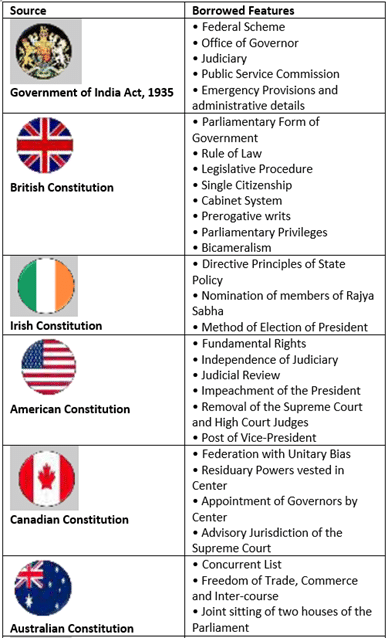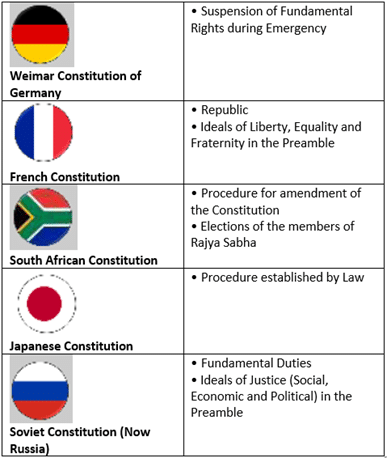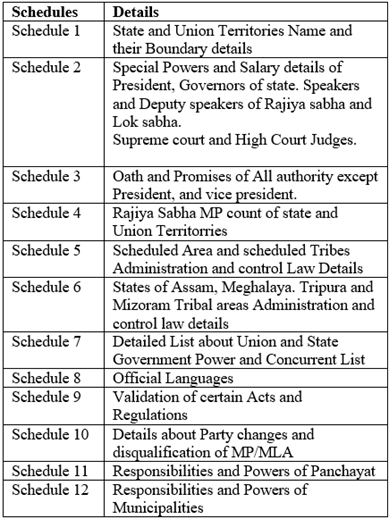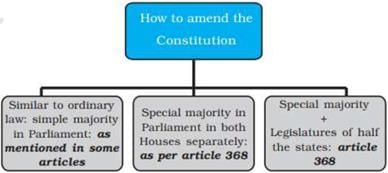Chapter - 3: Salient Features Of The Constitution (Gist) - UPSC MCQ
30 Questions MCQ Test Additional Study Material for UPSC - Chapter - 3: Salient Features Of The Constitution (Gist)
Which of the following features are common between the Constitution of India and the USA?
1. Single Citizenship
2. Three lists in the Constitution
3. Fundamental Rights
4. Federal system with strong centre
5. Judicial Review
6. Impeachment of the President
Select the correct answer using the codes given below:
1. Single Citizenship
2. Three lists in the Constitution
3. Fundamental Rights
4. Federal system with strong centre
5. Judicial Review
6. Impeachment of the President
Select the correct answer using the codes given below:
The 3rd Schedule of the Indian Constitution does not contain the provisions related to:
| 1 Crore+ students have signed up on EduRev. Have you? Download the App |
With respect to the 4th Schedule of Indian Constitution, consider the following statements:
1. Article 80 provides that the allocation of seats in the Council of States to be filled by representatives of the States and of the Union territories shall be in accordance with the provisions in that behalf contained in the fourth Schedule.
2. Article 4 provides for the consequential changes in First, Second and Fourth schedule necessary to provide effects to the provisions of law and as the Parliament may deem necessary.
Select the correct answer from codes given below:
1. Article 80 provides that the allocation of seats in the Council of States to be filled by representatives of the States and of the Union territories shall be in accordance with the provisions in that behalf contained in the fourth Schedule.
2. Article 4 provides for the consequential changes in First, Second and Fourth schedule necessary to provide effects to the provisions of law and as the Parliament may deem necessary.
Select the correct answer from codes given below:
With reference to the Directive Principle of State Policy, consider the following statements:
1. DPSPs are contained in Part III of the Indian Constitution.
2. The idea of DPSPs was borrowed from the Constitution of Ireland.
3. They impose a moral obligation on the state authorities for their application.
4. They aim to establish political democracy in the country.
Which of the above statements are correct?
Consider the following statements:
1. The Indian Constitution is solely based on the philosophy and ideals of Mahatma Gandhi.
2. The Constitution emphasizes fundamental principles of governance but disregards the matters pertaining to legislation of political convention.
Which of the above statements is/are correct?
Which of the following statement is not true with respect to the Indian Parliamentary form of Government?
Article 330 of Indian Constitution embodies:
Consider the following the statements:
1. Article 30 embodies rights of minorities to establish and administer educational institutions.
2. The 9th Schedule was incorporated under the provisions of the Constitution through 1st Constitutional Amendment Act, 1951.
Which of the statements given above is/are incorrect?
The provision for the Election to Upper House of Parliament under the Indian Constitution has been inspired from:
With regards to Co-operative societies, consider the following statements:
1. The 97th Constitutional Amendment Act of 2003 gave constitutional status and protection to co-operative societies.
2. It is a fundamental right under Article 19 of the Indian Constitution.
3. The strengthening of co-operative societies can be found in the state legislatures.
Which of the above statements are correct?
The Sixth Schedule extends to the provisions of tribal areas in states of:
Universal Adult Franchise provisions for every citizen who is not less than 18 years of age with a Right to Vote. Consider the following the statements in this regard:
1. It upholds the principle of equality in Indian democracy.
2. It is a fundamental right of all citizens.
3. The voting age was reduced to 18 years through 61st Constitutional Amendment Act, 1988.
4. It protects the interest of weaker sections.
Which of the above statements are correct?
Consider the following statements:
1. The Indian Constitution is quasi-federal in spirit and empowers the states to secede from the federation.
2. Article 352 enables the federal structure into a unitary one without a formal amendment of the Constitution.
3. Part XVIII contains the emergency provisions to meet any extraordinary situation effectively.
4. Article 365 deals with the failure to comply with directions of t he Centre.
Which of the above statements is/are correct?
Which of the following rights is embodied in the Article 27 of Indian Constitution?
Consider the following Statements:
1. Fundamental Rights are the absolutism of legislatures and executives.
2. Fundamental Rights explores social democracy.
3. Fundamental Rights are enforceable by the courts for their violation.
4. Supreme Courts issues writs in the matters of restoration of Fundamental Rights.
Which of the above statements is/are correct?
Which of the following provisions of the Constitution defy the secular character of the State?
Match List I (Schedules of Indian Constitution) with List II (Subject Matter) and select the correct answer using the codes given below the lists:
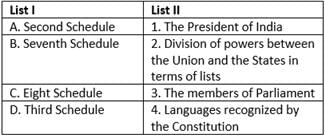
Codes:

Which of the following correctly explains the meaning of a federal form of government?
Which of the following features of the Indian Constitution have been borrowed from the Constitution of the USA?
1. Fundamental Rights
2. Idea of Residuary Powers
3. Power of Judicial Review
4. Independence of Judiciary
Select the correct answer using the code given below:
Which of the following features were borrowed by the Constitution of India from the British Constitution?
1. Rule of Law
2. Law-making Procedure
3. Independence of Judiciary
4. Parliamentary System
Select the correct answer using the code given below:
Dr B.R. Ambedkar proudly acclaimed that the Constitution of India has been framed after ‘ransacking all the known Constitutions of the World’. In this context, consider the following pairs:
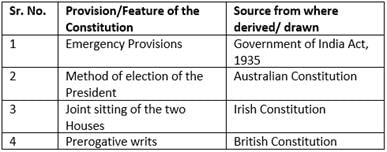
Which of the above pairs are correctly matched?
Consider the following statements regarding the Forty-Second Amendment Act, 1976:
1. It is termed as the Mini Constitution.
2. It added terms socialist, secular and justice to the Preamble of the Constitution.
Which of the above statements is/are not correct?
Which of the following provision of the Indian Constitution has been borrowed from the Weimar Constitution of Germany?
Which of the following provisions under the Constitution of India make it a ‘Welfare State’?
Which of the following article of the Constitution of India, empowers the Parliament to amend the provisions under the Constitution?
The concept of the Fundamental Duties is borrowed from:
Which of the following is/are the unitary feature/s of Indian Constitution?
1. Emergency Provisions
2. Veto on state bills
3. Parliaments Authority over state list
Select the correct answer using the codes given below:
Consider the following statements regarding 97th Constitutional Amendment Act of 2011:
1. It made right to form co-operative societies a Fundamental Right.
2. It included a new DPSP on promotion of co-operative societies.
Which of the statements given above is/are not correct?
Which of the following provisions of the Constitution reveal the secular character of the Indian State?
1. The State shall not deny to any person equality before the law or equal protection of the laws.
2. Equality of opportunity for all citizens in matters of public employment.
3. The State shall endeavour to secure for all the citizens a Uniform Civil Code.
Select the correct answer using the codes given below:
With regard to Universal adult franchise, consider the following statements:
1. It enhances the self-respect and prestige of the common people and opens up new hopes and vistas for weaker sections.
2. The 61st Constitutional Amendment Act provided for Universal adult franchise.
Which of the above statements is/are correct?
|
20 videos|561 docs|160 tests
|
|
20 videos|561 docs|160 tests
|


